
OCTOBER 2005
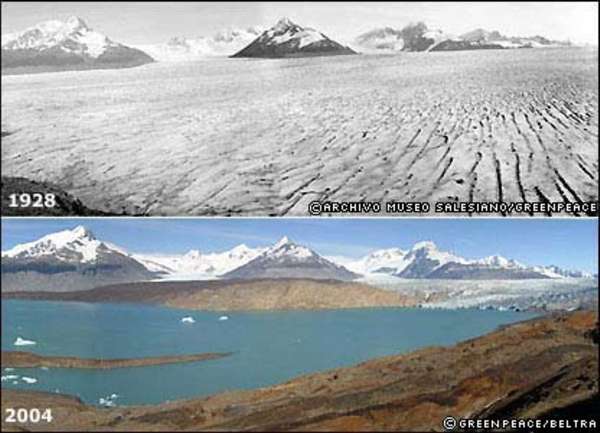
World View of Global Warming
by Gary Brasch
"In my view, climate change is the most
severe problem that we are facing today -- more serious
even than the threat of terrorism."
With this warning to an international science meeting in February 2004, David A. King, Chief Scientific Advisor to the British Government, brought the issue of global warming into sharp focus.
The World View of Global Warming project is documenting this change through science photography from the Arctic to Antarctica, from glaciers to the oceans, across all climate zones. Rapid climate change and its effects is fast becoming one of the prime events of the 21st century. It is real and it is accelerating across the globe. As the effects of this change combine with overpopulation and weather crises, climate disruptions will affect more people than does war.
The 2004 average global temperature
ranked as fourth warmest on record, slightly cooler than
2002 and 2003. The record warm year is 1998,
according to NOAA. The 10 warmest years on
record have all occurred since 1990. In response,
our planet has been changing with warming winds and
rising seas. At the poles and in mountains, ice is
under fire and glaciers are receding. Down into the
temperate zone, change is rearranging the boundaries of
life. The plants and animals with whom we share the
planet are adapting and moving -- some even going extinct
-- because they have no choice.
We six billion humans are being
affected, too. Coastal towns are suffering from
rising sea level and 27,000 people died in European heat
waves in 2003. However, we have choices to
make to help correct and ameliorate global warming.
This is a story of frightening scale and and great
urgency that is just beginning to be told.
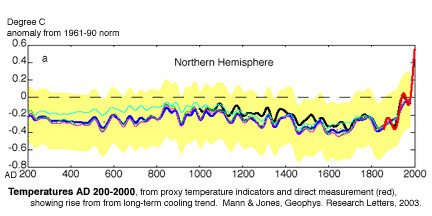
I began photographing climate change in 1999, about when
scientists started to realize how great a change in
temperatures is taking place in our time. Past earth temperatures
left their mark in tree rings, glaciers and ancient lake
and ocean sediments, and the record shows slowly
decreasing temperatures over the last 2000
years. In that time there have been warm and cool
periods, but nothing remotely like the rise in
temperatures in the past 150 years. This graph has
become the single most powerful icon of climate change.
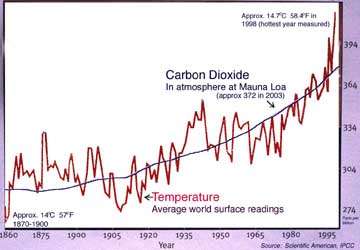
The reason for this sharp rise in global temperatures
since the 1850s is generally thought to be a steep
increase in atmospheric carbon dioxide -- CO2 -- from
human use of fossil fuels. Ice core records show that
whenever CO2 has increased in the Earth's past, so has
temperature. This is exactly what the facts of greenhouse
warming are, that gases like CO2 and methane reflect the
sun's heat back onto the earth, heating it. A closer look
at the last 150 years of surface temperature from 1860 to
2001 shows the rise has been uneven, but steep, while
atmospheric CO2 has risen steadily to above 370 parts per
million, the highest level in more than 420,000 years.
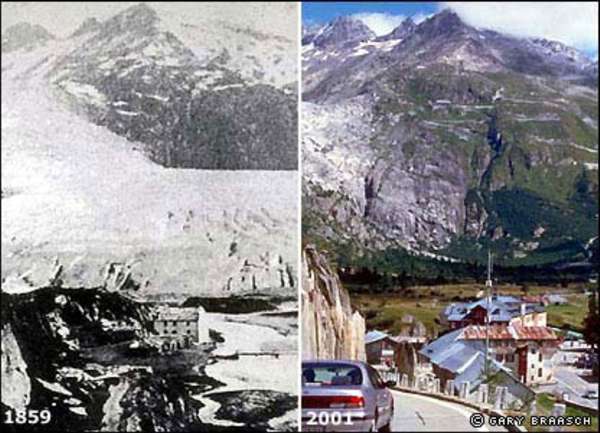
The year 1998 was the warmest on record, 2002 and 2003
tied for second, and 2004 the fourth warmest. 2005 may be
even warmer. In July 2005 land surface temperatures were
2nd highest on record globally with Scandinavia, much of
Asia, North Africa and the western US, while below
average temperatures occurred in northern Canada and
northern Alaska. Ocean temperatures were also 2nd highest
on record, and the Arctic Ocean continued to set records
for loss of ice cover.
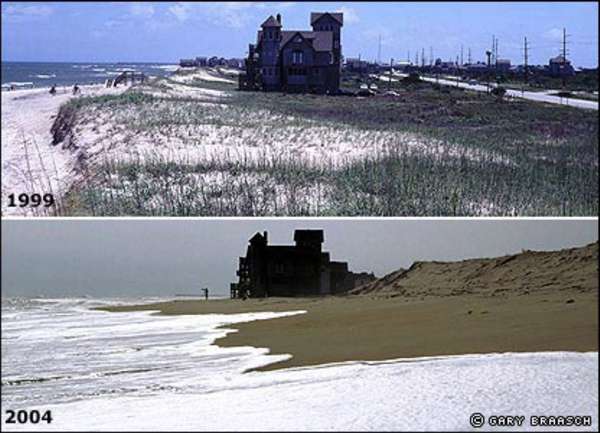
According to NOAA, the global warming rate in the last
25 years has risen to 3.6 degrees F per century, which
tends to confirm the predictions of temperature increases
made by international panels of climate scientists
(IPCC). The rate of CO2 increase is also accelerating
steeply, and thelevel in early 2004 was 379 p.p.m.
To keep up on current temperature and weather extremes,
please link to
http://www.ncdc.noaa.gov
/oa/climate/research/2005
/perspectives.html
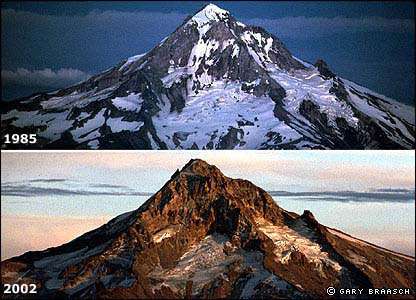
This project would be impossible without scientists
and observers around the world who have provided hundreds
of scientific contacts and papers. See
Background, Advisors, and Reference for
documentation, funders and major advsors, without whom I
could not complete the work. This project is privately
supported and I seek donations through Blue Earth Alliance.
"Polar Thaw," a 30-print exhibit of photographs from locations of Arctic and Antarctic climate warming, is available for museums, science centers and funded public venues.
World View of Global Warming is a project of the Blue Earth Alliance, Seattle Washington, a 501(c)3 tax-exempt organization. The project is supported entirely by donations, grants, and license fees for the photographs. Information about how to contribute is on the Blue Earth web site, or contact Gary Braasch. Thank you.
This project is featured in The
Nieman Reports, Harvard University, Winter 2002,
in a special section on Environmental Reporting. Link to PDF version
Photography and text Copyright © 2005 (and before) Gary Braasch All rights reserved.
MEDIA LENS: Correcting for the
distorted vision of the corporate media
September 1, 2005
MEDIA ALERT:
CHEERLEADING THE CLIMATE CRIMINALS -
PART 1 and 2
A Raging Debate in Nowhere
Land
Earlier this month, New Scientist reported the
astonishing news that the world's largest frozen peat
bog, comprising an area the size of France and Germany
combined, was melting. According to researchers who have
been studying the permafrost of western Serbia, the bog
could unleash billions of tonnes of methane, a greenhouse
gas twenty times as potent as carbon dioxide, into the
atmosphere. If this were to happen, the consequences for
the climate system, and for humanity, would be appalling.
(Fred Pearce, 'Climate warning as Siberia melts,' New
Scientist, August 13, 2005)
One of the researchers involved warned of an
"irreversible ecological landslide." Another
concerned scientist said: "When you start messing
around with these natural systems, you can end up in
situations where it's unstoppable. There are no brakes
you can apply." (Ian Sample, 'Warming hits
"tipping point",' The Guardian, August 11,
2005)
In response, Tony Juniper, director of Friends of the
Earth, said: "If we don't take action very soon, we
could unleash runaway global warming that will be beyond
our control and it will lead to social, economic and
environmental devastation worldwide." (Sample,
ibid.)
But within just a couple of days, a surreal silence had
descended. Where werethe declarations by governments of radical
action on energy, trade, transport and food production?
Where were the impassioned newspaper editorials? Where
were the urgent television and radio debates? Nowhere.
One can only conclude that our society is, quite
literally, insane.
The devastation wreaked by Hurricane Katrina, with
hundreds killed, is likely a portent of worse to come in
a warming world. Although +individual+ extreme events
cannot unambiguously be causally linked to human-induced
climate change, climate modellers predict that the
severity and frequency of such events are expected to
increase under global warming. Indeed, the calamitous
weather-related events of 2005 - such as the wildfires in
Spain and Portugal, and devastating flooding in India -
fit the predicted pattern resulting from human-induced
climate change.
A recent study published in Nature by Kerry Emanuel, a
climate researcher at Massachusetts Institute of
Technology, makes sobering reading. Emanuel reported a
near doubling in power of tropical cyclones since the
mid-1970s, noting that this "should be a matter of
some concern, as it is a measure of the destructive
potential" of such violent events.
Although it is not yet clear to what extent climate
change may be playing a role 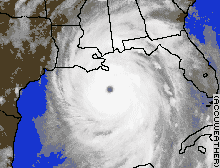 here, the climate scientist concluded that
"future warming may lead to an upward trend in
tropical cyclone destructive potential, and - taking into
account an increasing coastal population - a substantial
increase in hurricane-related losses in the twenty-first
century." (Emanuel, 'Increasing destructiveness of
tropical cyclones over the past 30 years,' Nature, Volume
436, pp.686-688, August 4, 2005)
here, the climate scientist concluded that
"future warming may lead to an upward trend in
tropical cyclone destructive potential, and - taking into
account an increasing coastal population - a substantial
increase in hurricane-related losses in the twenty-first
century." (Emanuel, 'Increasing destructiveness of
tropical cyclones over the past 30 years,' Nature, Volume
436, pp.686-688, August 4, 2005)
In July, researchers from the Benfield Hazard Research
Centre at University College in London predicted a very
active hurricane season in the tropical north Atlantic
ocean. ('Hurricane season set to be stormy,' BBC news
online, July 2005; http://news.bbc.co.uk/1/hi/sci/tech/4671535.stm) This has been tragically borne out in recent
days.
The main driving force, warned the Benfield Centre's
Professor Mark Saunders, is likely the unusually warm sea
temperatures in the region. Although fluctuating sea
surface temperatures in this part of the global ocean
have a natural cycle of 50-60 years, Professor Saunders
believes that climate change may be contributing to
"another exceptionally active Atlantic season in
2005". He adds: "I think one has to wonder
whether at least part of this activity could be due to
global warming. Certainly, sea temperatures where
hurricanes form have been the warmest on record over the
last year or two."
One Decade To Save The
Planet
Before the New Scientist report on melting permafrost
appeared, it was already known that we have
vanishingly little time to avert climate chaos. An
international task force on climate, co-chaired by former
Blairite minister Stephen Byers, concluded earlier this
year that we could reach "the point of no
return" in as little as a decade. (Geoffrey Lean,
'Apocalypse now: how mankind is sleepwalking to the end
of the earth,' Independent on Sunday, February 6,
2005)
The United Nations estimated in 2004 that global warming
has already led over the past decade to nearly 500,000
deaths, has impacted over 2.5 billion people and has
generated economic losses of over $690 billion. (Ted
Glick, 'Needed: A Global Survival Movement,' Future Hope
column, August 17, 2005, via email)
But none of this is allowed to divert media managers from
faithfully serving the cause of business as usual. Look
at the Guardian newspaper, for example. Less than two
weeks after the shocking news of the melting Siberian
permafrost, this custodian of liberalism was waxing
lyrical over "buoyant corporation tax receipts"
and the US "defy[ing] economic gravity"; and
was recklessly calling for "stronger world
growth". This, the reader was assured, "would
be very welcome in Britain." (Leader, 'The luck
factor,' The Guardian, August 22, 2005)
What lunacy is this? How can any responsible editorial
writer welcome the stoking up of "world
growth", further exacerbating the climate
catastrophe that already faces us? Accelerating the
global juggernaut of unsustainable economic
"growth" would not simply be reckless, but it
would constitute the greatest ever crime against
humanity. To behave as a cheerleader from the sidelines,
as the Guardian is doing, is to act as an accessory to
that monstrous crime.
And all this from the newspaper hailed by Friends of the
Earth's director, regular readers may recall, as
"the voice of progressive and sound environmental
thinking both in the UK and in Europe." (Tony
Juniper, quoted by Ian Mayes, 'Flying in the face of the
facts,' The Guardian, January 24, 2004)
It is obvious to rational observers that the Guardian is
reluctant to alienate Tony Blair, his ministers and his
advisers. It would not do for the paper to be too
challenging of the government, and of the establishment
generally, for fear of cutting off its crucial fount of
'lifeblood'; namely, access to the corridors of power for
what counts as 'news'.
More to the point, the Guardian's senior managers - the
board directors of the Guardian Media Group plc - are
themselves intimately part of the establishment. They are
wealthy and influential people, such as chairman Paul
Myners, who sits on the board of the Bank of New York
Inc; finance director Nicholas Castro, previously a
partner with KPMG, one of the world's largest
professional services firms; company secretary Philip
Boardman, former financial controller of Hickson
International, a large chemicals concern; John Bartle
CBE, who has worked for Cadbury Schweppes, the giant food
and drinks corporation; and Sir Robert Phyllis, a former
BBC deputy director-general and chief executive of ITN.
(GMG board of directors, http://www.gmgplc.co.uk/gmgplc/aboutus/directors/)
These individuals are all members of a social, political
and economic elite that benefits from a deeply divisive
and unjust capitalist system of privilege and
exploitation. It is no surprise that the newspaper group
they manage is loath to challenge this same system.
Charles Lewis, a former producer of the US current
affairs programme '60 Minutes', who resigned to fund the
Centre For Public Integrity, put it this way:
"The values of the news media are the same as those
of the elite, and they badly want to be viewed by the
elites as acceptable. Socially, culturally, and
economically they belong to the group of people they are
covering." (Quoted, Alexander Cockburn and Ken
Silverstein, 'What the papers don't say,' The Observer,
May 26, 1996)
Take, for instance, a recent interview with Hilary Benn,
the UK international development secretary. "If the
prime minister had wanted an easy life", Benn told
the Guardian, "he wouldn't have picked these two
subjects (Africa and climate change) for the [G8]
summit". On the topic of Blair and climate change,
Benn claimed - presumably with a straight face -
"he's committed and determined."
Judging by the absence of any critical questioning in the
published piece, the Guardian's reporters - one of them
the paper's political editor - swallowed this guff
wholesale. (Michael White and Patrick Wintour, 'G8
summit: Interview. Benn tells how G8 and African leaders
must prove themselves,' The Guardian, July 5, 2005)
Bequeathing a Dying Planet
to the Next Generation
This obsequiousness in the face of government propaganda
on climate is not limited to the Guardian.
In an interview with the right-leaning Daily Telegraph,
Elliot Morley, minister for the environment and climate
change, said the government was committed to a review of
its policies on climate by the end of the year:
"We should have an open mind about the kind of
levers that we apply and not be afraid to think the
unthinkable." Morley claimed that "my job is to
consider quite radical new approaches." (Charles
Clover, 'Energy ration cards for everyone planned,' Daily
Telegraph, July 2, 2005)
These "quite radical new approaches" may
include personal energy ration cards. However, they do
not extend to cutting the huge fossil fuel subsidies
given annually to the fossil fuel industry (see Part Two
tomorrow), and giving them instead to the renewable
energy sector or to public transport systems. That would
not be "radical" to established power and its
sycophants; simply unthinkable.
Also unthinkable is the notion that our leaders
prioritise policies that benefit the few at the expense
of the vast majority. The message from Downing Street,
doggedly relayed by even the 'best' news media, is that
we should praise Tony Blair, or at least accept that he
is acting in our best interests. Thus, an editorial in
the Financial Times tells us: "the prime minister
deserves credit for getting significant progress on some
of the broadest issues ever tackled by the G8 - aid to
Africa, climate change and world trade". (Leader,
'Now G8 leaders must follow up their words,' Financial
Times, July 9, 2005)
The Independent's environment editor toes the same
establishment-friendly line in a comment piece that glows
with admiration for the prime minister's efforts:
"Mr Blair's attempt at Gleneagles to start a climate
change partnership with the developing world, or at least
initiate a dialogue, is vital." (Michael McCarthy,
'Waiting in the wings: the other leaders who must take a
giant leap for the planet,' The Independent, July 5,
2005)
Sadly, as rational observers saw at Gleneagles, the G8
summit was a pathetic failure in terms of meaningful
action on climate. In particular, the US, which has never
signed up to Kyoto, continues to drag its oil-soaked
feet. Tearfund, a Christian relief and development
agency, noted that the "G8 failure to act on climate
change puts millions of lives at risk". (www.tearfund.org.uk, news item, July 8, 2005)
Veteran environmentalist Mayer Hillman spoke of his
"dismay in seeing world leaders failing to deliver
what its citizens have a right to expect of them."
Hillman called on Blair and other world leaders to
endorse the Global Commons Institute's Contraction &
Convergence framework based on equal per capita emissions
of greenhouse gases. (See Global Commons Institute
website at www.gci.org.uk)
Hillman urged that only such "urgent action... far
more ambitious and visionary than reflected in the final
Gleneagles communiqué, will prevent them [world leaders]
handing over a dying planet to the next generation."
('The G8 and climate change: a campaigners' scorecard,' http://opendemocracy.net/globalization-G8/climate_reaction_2672.jsp, July 13, 2005)
Tragically, but true to form, the G8 summit - not just on
climate, but on aid, trade and Africa - was marked by
empty promises, deceit and deception. The reality of the
Gleneagles meeting, notes historian Mark Curtis,
"makes a mockery of Brown and Blair's claim that
poor countries are now free to decide their own
policies." (Curtis, 'How the G8 lied to the world on
aid,' The Guardian, August 23, 2005)
However, the mainstream media is incapable of seeing the
Machiavellian strategy that lies behind Blair's
'leadership'. Blair knows that Iraq rumbled him as a
ruthlessly dictatorial liar and cynic; Africa and climate
change are transparent attempts to restore his fraudulent
moral capital. He knows that the root of his power has
always lain in +appearing+ to be an enlightened
politician of the so-called centre-left, while acting in
the service of ruthless, violent state-corporate power.
But nothing is too much, nothing is the final straw, for
the liberal media. Blair is always given one more chance
to prove that his heart is in the right place.
On occasion, space on the comment pages is provided to
allow accredited experts, such as distinguished
scientists, to express their concerns; but only if such
invited guests remain within the required boundaries of
acceptable debate.
Thus, eminent climate physicist John Houghton, former
chief executive of the UK's Meteorological Office and
former chairman of the Royal Commission on Environmental
Pollution, claims that "Tony Blair has shown
unflagging determination" in addressing the climate
crisis. He goes on: "Blair, admirably, wants the G8
to rise above parochial interests and act on the world's
most pressing problems." (John Houghton, 'Take the
flood tide now. Britain's top climatologist says a G8
fudge on global warming could be disastrous,' Independent
on Sunday, June 26, 2005)
Sadly, the government's 'commitment' and 'achievements'
on aid, Africa and climate change are but cruel myths. As
discussed above, the prime minister's hopes of 'moving
on' from Iraq by exploiting the issues of Africa and
climate are little more than a desperate bid to divert
attention from his war crimes. Blair is assisted in this
task by many industrious media professionals.
Consider John Rentoul, one of the most slavish
cheerleaders for Tony Blair anywhere in the British
media, who outdoes even his own exalted standards of
high-flown rhetoric when he proclaims of the British
leader:
"Not having to face the electorate again he has made
saving the planet from climate change one of his legacy
projects for his third term." (Rentoul, 'G8: he who
has no election to face is well placed to save the
planet,' Independent on Sunday, July 3, 2005)
As inane interview mounts upon farcical editorial upon
vapid 'news' article, the media 'consumer' is lulled into
a false sense of 'something being done'; and that the
prime minister is grappling with the climate threat with
great tenacity. These are dangerous delusions.
Part 2: The Independent: As
Good As It Gets?
The Independent - like the Guardian, a newspaper with
supposed progressive credentials - noted blandly in a
recent editorial that "Global warming is given
little coverage by the US media." (Leader, 'The
American consensus of denial is crumbling,' August 19,
2005). True enough. But look at our own doorstep; at the
wholly inadequate coverage of climate change in the
British media, the Independent very much included.
Effusive praise for the Independent's climate coverage
appeared recently in the paper's letters page from a
reader in the United States who wrote:
"The Independent has been a cut above the rest. The
frequency with which you address global warming is
entirely appropriate to the seriousness of the
problem." (Lead letter, 'US still in denial over
global warming,' The Independent, August 20, 2005)
One can imagine the glow of satisfaction felt by the
letters page editor on being able to print those remarks.
Is Media Lens being too critical? Surely, the Independent
does address climate change quite frequently, even
providing occasional front-page coverage. Yes, but look
at the +content+ of this coverage. In leaders and news
reports, the paper's editors and reporters ignore the
unsustainable nature of endless economic growth on a
finite planet. They overlook the links between climate
catastrophe and the damaging core practices of global
corporations and investors.
Where are the leading articles or news reports
highlighting the insidious efforts of big business to
obstruct the rational policies on energy, transport, food
production and trade that we need so urgently? Where are
the news stories addressing the billions spent annually
by business and the public relations industry on
promoting unsustainable consumer consumption?
Where are the editorial denunciations of the British
government's active role in this madness, driving
humanity inexorably towards the climate "tipping
point" and into the abyss beyond? Why, instead, do
the major news media so often uncritically channel
propaganda from the number 10 Downing Street press office
about Blair being 'passionate' about and 'committed' to
tackling the climate challenge?
The reason, of course, is that the corporate media are
themselves very much ad-packed, consumer-driven parts of
the problem.
Profligate Consumption =
Doomed Children
Tackling climate change rationally would also reduce
global poverty. The great Gleneagles G8 jamboree, and its
attendant media circus, ignored this dangerous truth. The
London-based New Economics Foundation (NEF)
conservatively estimates that global fossil fuel
subsidies, paid to rich corporations out of the public
purse, amount to $235 billion annually. Just one year's
worth of these subsidies could wipe out all of
sub-Saharan's entire international 'debt', with billions
to spare. (NEF, 'The price of power,' 2004, downloadable
report from www.neweconomics.org)
Will the new UK 'Climate Movement' - which includes
Greenpeace, Friends of the Earth, Christian Aid and Oxfam
- launched on September 1 with the slogan 'Stop Climate
Chaos', speak such uncomfortable truths? Will the
campaign point to the astonishing collusion of leading
politicians in corporate criminality in blocking
effective action on climate? Will the Climate Movement
critically appraise the media's role in perpetrating
climate crime? Or, looking at the campaign's new website
(www.stopclimatechaos.org), as well as judging by the past performance of
several large NGOs in the new coalition, will it instead
pull a veil over such crucial matters? ('Silence is
Green,' Media Alert, February 3, 2005; http://www.medialens.org/alerts/05/050203_silence_is_green.php)
Aside from the massive public handouts given to fossil
fuel dinosaurs, there is also the enormous damage to the
planet associated with burning oil, coal and gas.
According to NEF, the costs of natural disasters mostly
linked to global warming have now reached $60 billion
annually. This sum excludes the human misery resulting
from global warming related death, illness, injury and
loss. Consider, too, that the US has spent around $300
billion in the last three years of war in Afghanistan and
Iraq - wars in which oil is a major motivating factor.
(Ted Glick, 'Needed: A Global Survival Movement,' Future
Hope column, August 17, 2005, via email)
As the authors of the NEF
report conclude:
"[I]t doesn't have to be like this. Clean renewable
energy sources have huge, barely tapped potential. Not
only can they provide all the energy needed for human
development, they can also abate the pollution that adds
to climate change and kills countless people every year.
They can supply +power+ to communities, but where the
technology is developed, implemented and maintained by
local people, they can also +empower+ communities who
have in other ways been marginalized." (NEF, ibid.)
Why can't Blair, Brown and the rest of our corporate
leaders see this? What would it take to make them change
course? Would the system of corporate capitalism, whose
goals they project, even +permit+ them to change course?
Quite literally, what are they thinking? Psychologist
Oliver James, author of 'Britain on the Couch', hints at
the truth:
"Both Tony Blair and Gordon Brown are utterly
committed to economic growth and for that to keep
happening, we have to keep on consuming new products. I
have talked to two of Blair's key advisers at some
length, and the fact is that the Treasury refuses to
countenance any ecological legislation that threatens
affluence... [Blair and Brown] know perfectly well
that unless we call a halt to our profligate consumption,
their children or children's children are doomed."
(James, 'Heat: Heads in the sand,' The Guardian
supplement on climate change, June 30, 2005)
Blair and Brown may indeed know that this is the case.
Both have expressed concern about climate change. They
are clearly not wholly blind to the dangers; dangers that
do, of course, represent a threat to entrenched power.
After all, even the mighty system of global capitalism is
not immune to the chaos of climate instability.
But the fundamental point is that, to reach their
powerful positions in society, Blair, Brown and other
western leaders have had to subordinate the planet's
future to the prerogative of global economic
"growth"; or, to put it more honestly - to the
bottom-line corporate expediency of endless profit
benefiting privileged sectors of society. Any would-be
political leader determined to change the current
patterns of production and consumption would barely get
out of the starting blocks, never mind reach the
finishing tape of real political power.
As Canadian philosopher John McMurtry once shrewdly
observed of the prime minister:
"Tony Blair exemplifies the character structure of
the global market order. Packaged in the corporate
culture of youthful image, he is constructed as sincere,
energetic and moral. Like other ruling-party leaders, he
has worked hard to be selected by the financial and media
axes of power as 'the man to do the job'. He is a moral
metaphor of the system." (McMurtry, Value Wars: The
Global Market Versus the Life Economy, Pluto Press,
London, 2002, p.22)
The same filtering process applies to the vast majority
of leaders in positions of authority. They have all risen
to the top in a hierarchical society that is shaped
largely by the intertwined requirements of corporate
interests and geostrategic power.
If current trends continue, the consequences for humanity
could well be terminal.
www.medialens.org
Media Lens encourage Readers to write to the
Newspapers ; they provide the following addresses:
Write to Michael McCarthy, environment editor of the
Independent:
Email: m.mccarthy@independent.co.uk
And to his editor, Simon Kelner:
Email: s.kelner@independent.co.uk
Write to Geoffrey Lean, environment editor of the
Independent on Sunday:
Email: g.lean@independent.co.uk
And to his editor, Tristan Davies:
Email: t.davies@independent.co.uk
Write to Charles Clover, environment editor of the Daily
Telegraph:
Email: Charles.Clover@telegraph.co.uk
And to his editor, Martin Newland:
Email: Martin.Newland@telegraph.co.uk
Write to John Vidal, environment editor of the Guardian:
Email: john.vidal@guardian.co.uk
And to his editor, Alan Rusbridger:
Email: alan.rusbridger@guardian.co.uk
Write to Roger Alton, editor of the Observer:
Email: roger.alton@observer.co.uk
Write to Andrew Gowers, editor of the Financial Times:
Email: andrew.gowers@ft.com
Please also send all emails, particularly any replies
from the media, to the Media Lens editors:
Email: editor@medialens.org

This week, the United States Senate
-- once a hallowed legislative institution known for its
gravitas and intellectual debates -- stooped to a new low
by inviting best-selling novelist Michael Crichton to
provide expert testimony on climate change. Crichton's
latest novel, "State of Fear" casts doubt on
the science of global warming and the author has called
global warming "the greatest hoax ever perpetrated
on the American people." As the New York Times
points out, centrist think tanks and scientists alike
have given Crichton's own junk science scathing reviews.
"More silly than scary," wrote the Natural Resources Defense
Council. "Notable mainly for its nuttiness,"
wrote the Brookings Institution. "Does not
reflect scientific fact," wrote the Union of
Concerned Scientists. But to many in the US Senate,
apparently Crichton's word is scientific enough. "I
am Michael Crichton, known to most people as the creator
of Jurassic Park and the creator of the television series
ER." The author then proceeded to rattle off his
science credentials: degrees from Harvard College and
Harvard Medical School, a stint as visiting lecturer of
physical anthropology at Cambridge and a postdoctoral
fellowship at the Salk Institute. Of course none of these
positions have any direct link to the science of global
warming, but that didn't seem to matter to conservative
American senators who, apparently lacking a credible
scientist to serve as a critic of global warming
theories, were forced to turn to the world of
make-believe to back their case. As the Guardian
points out, a 2004 survey of 900 peer-reviewed studies on
climate change failed to produce a single report that
didn't conclude that man-made activity is, indeed,
causing climate change.
Crichton came to the Senate at the invitation of
Republican Senator James Inhofe. "Dr. Crichton's
science background has served him well in providing
material for his books, many of which explore scientific
issues, my favorite is State of Fear," Imhofe said.
"I urge you all to read this book."
Across Europe, scientists and policymakers have been
following Crichton's book with dismay since it hit the
bestseller lists -- after all he sells millions of books
and influences many people. But on Thursday, many are
baffled at the idea of the world's most important
legislative body turning to the author of thrillers to
help them determine climate change policy.
SPIEGEL ONLINE http://service.spiegel.de/cache/international/0,1518,377270,00.html